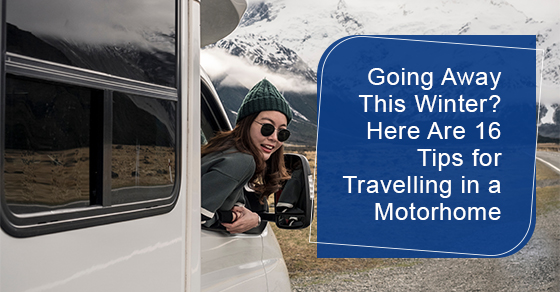Going Away This Winter? Here Are 16 Tips for Travelling in a Motorhome
If you have a motorhome and plan to hit the road headed to warmer climes this winter, you want to be prepared for travel. Whether it is understanding possible pandemic-related rules or finding a safe place to camp for the night, you want to ensure your travels are stress-free. Especially if this is your first trip to your new motorhome, you need to prepare for the unexpected. Here we offer 16 tips on going away this winter in your new motorhome.
1. COVID travel to the U.S.
You will need to be fully vaccinated with either both doses of a two-dose vaccine, one dose of a single-dose regimen at least two weeks before the travel date or a mixed dose regimen. Be sure to have government-approved proof with you.
2. Pack essentials
Travel light with only the essentials:
- A good mix of clothes for all weather scenarios
- Toiletries
- Food
- Phone chargers
- Universal adapter
- Flashlights
- Bug repellant
- Sunscreen
- Matches/lighter
3. Plan out your camping spots
Although it can be fun just hitting the road, you want to be safe on your travels. Plan out your route before you leave Canada, and consider your daily journeys as you leave each campsite. Although you might think you can park your motorhome anywhere, this is not the case. You need to find designated spots and also want to make sure you have access to water. You can face hefty fines in many states, even just for pulling over to the side of the road, so make sure you have a destination for overnight stops, whether it is campsites or other accommodations.
4. Have your motorhome checked by a mechanic
The last thing you want is to break down mid-trip, or worse, get into an accident because of something like faulty brakes. Have a professional assessment of your motorhome before hitting the road for peace of mind and safety.
5. Fill the water tanks
If you have running water, make sure you understand where that water comes from! Most higher-end motorhomes have water tanks and wastewater tanks that need to be filled/emptied. Be sure you know how to do this, how often to do it, and where to do so at each campsite.
6. Be energy smart
Look for campsites that offer electrical hookups so you don’t make the mistake of draining your motorhome battery. This is a rookie mistake that can happen by leaving lights or the radio on at bedtime.
7. Put your flashlight in the same place
Have a designated spot where you store your flashlight, so you always know where to find it. You might even want to keep one beside your bed just in case you need it. Whether you hear something outside, need to use the bathroom outdoors, or anything else for that matter, your flashlight should be handy, and your batteries should be working. Many campers prefer “headlamps” when camping as it allows them to light things up hands-free.
8. Keep your bed cozy
Have everything you need for your bed, such as pillows, sheets, and a duvet, to make sure you are nice and cozy when sleeping. Depending on where you travel, it can get very cold at night, even in the desert.
9. Keep your things locked up
Whether you are sleeping or heading out for the day, always make sure you lock up your motorhome to keep prowlers out. Although most fellow campers are harmless, you never know who might enter the campgrounds looking for opportunities to commit crimes.
10. Open the windows
Air out your motorhome, often opening the windows to let the air circulate. Your motorhome can act like an oven in hotter areas, and you don’t want to put yourself at risk.
11. Budget wisely
Do your research so you understand how costly this type of road trip can get. Rising gas prices, food, restaurant stops, and staying at campgrounds add up. Some campgrounds can be just as expensive as hotels depending on the amenities and location. You don’t want to run out of money in the middle of nowhere!
12. Choose shady, “lonelier” sites
When you’re choosing a campsite, opt for sites with shade and further away from the crowds. Campgrounds can get pretty rowdy at night, and you want to be in a lonelier area of the park to reduce noise levels. Shade also helps keep sleeping cooler.
13. Keep food and drink well stocked
Check your fridge and pantry to see if you’re running low on anything whenever you reach a town. You don’t want to end up travelling along an empty highway without anywhere to stop for food. You should have snacks, alcohol, food and water, so you are never caught unawares.
14. Watch your fuel
You also don’t want to run out of gas. Always keep an eye on fuel and be sure to fill up when heading out on the highway. Just like you might find a shortage of grocery stores, you can also run into long stretches without gas stations. After a while, you’ll get to understand your fuel consumption, so you’ll know how far a tank will contact you.
15. Let people know your plans
Make sure there is at least one person who knows where you are at all times. You want people to know something could be wrong if you don’t check-in. Also, should something happen at home, you want people to know how to reach you.
16. Get insurance
Last but not least, speak to your
insurance broker to make sure you have proper
motorhome insurance in Ottawa, RV enthusiasts need to protect their belongings while they travel. Should there be an accident or break-in, your coverage will apply to replacements and repairs. Many people make the mistake of only getting the bare minimum to find they aren’t covered for liability if they cause damage to a campsite or other campers or replacement for items like a TV, sound system or camping gear. You should probably get
travel insurance as well! To learn more about the motorhome insurance Ottawa needs before heading out on the open road, call our team at 613-224-1455 or
contact us here.


